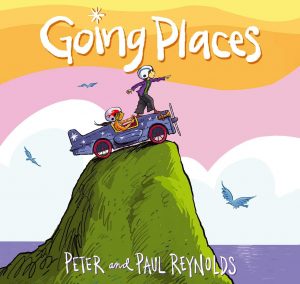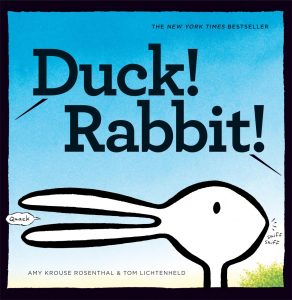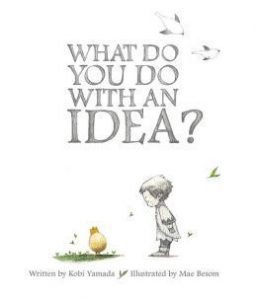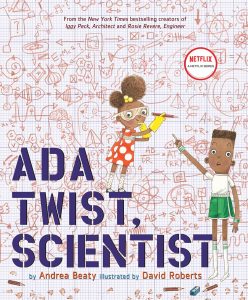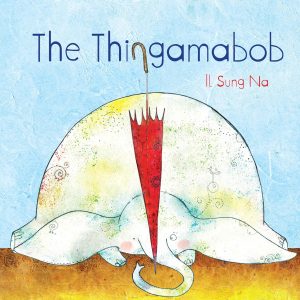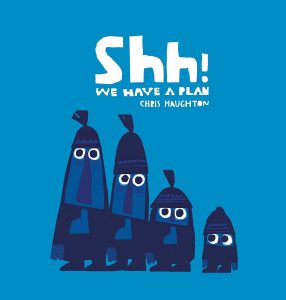Thinking is one of the three Core Competencies in the BC curriculum. Critical and Reflective Thinking is one of two sub-competencies in this area.Listed below are selected resources for teachers, picture books, fiction, and non-fiction related to critical and reflective thinking.
La réflexion est l’une des trois compétences de base du programme d’études de la C.-B. La pensée critique et réfléchie est l’une des deux sous-compétences de ce domaine. La pensée critique et réfléchie est l’une des deux sous-compétences de ce domaine. Vous trouverez ci-dessous une sélection de ressources pour les enseignants, des livres d’images, des ouvrages de fiction et des ouvrages non romanesques liés à la pensée critique et réfléchie.
Ressources pour les enseignant (Teacher Resources)
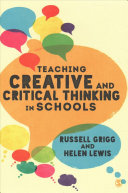 Teaching creative and critical thinking in schools,
Teaching creative and critical thinking in schools,
by Russell Grigg and Helen Lewis
Niveau scolaire (Grade level): K – 12
This book provides guidance on how to develop creative and critical thinking through your classroom teaching. Key coverage includes classroom-ready ideas to stimulate higher-order thinking, how to think critically and creatively across all areas of the curriculum, and philosophical approaches that give students the space to think and inquire. Case studies from primary, secondary and special schools are included.
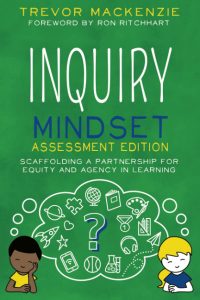 Inquiry mindset: scaffolding a partnership for equity and agency in learning,
Inquiry mindset: scaffolding a partnership for equity and agency in learning,
by Trevor MacKenzie
Niveau scolaire (Grade level): 10 – 12
Co-design assessment with your students to create both a sense of belonging and ownership over learning in the classroom. Establish greater clarity and a deeper understanding for your students in how they’ll be assessed. Positively impact achievement and scores as well as your students’ sense of self and personal responsibility and autonomy.
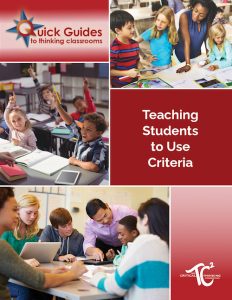 Teaching students to use criteria,
Teaching students to use criteria,
by Llan Danjoux, Usha James, Laura Gini-Newman, & Garfield Gini-Newman
Niveau scolaire (Grade level): K – 12
When students are invited to respond to critical questions, criteria enable them to carefully weigh the options and make reasoned judgments about those questions.
 Fact vs. fiction: teaching critical thinking skills in the age of fake news,
Fact vs. fiction: teaching critical thinking skills in the age of fake news,
by Jennifer LaGarde and Darren Hudgins
Niveau scolaire (Grade level): K – 12
This book provides educators with tools and resources to help students discern fact from fiction in the information they access not only at school, but on the devices they carry in their pockets and backpacks.
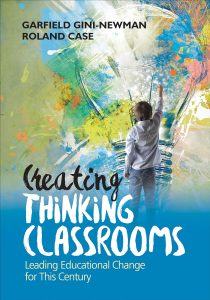 Creating thinking classrooms: Leading educational change for this century,
Creating thinking classrooms: Leading educational change for this century,
by Garfield Gini-Newman and Roland Case
Niveau scolaire (Grade level): K – 12
This book suggests that aligning teaching with five key principles – engaging students, sustaining inquiry, nurturing self-regulated learners, creating assessment-rich learning, and enhancing learning through technology – can put creative, critical, and collaborative thinking at the core of 21st century schools.
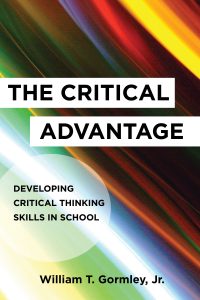 The critical advantage: Developing critical thinking skills in school,
The critical advantage: Developing critical thinking skills in school,
by William T. Gormley Jr.
Niveau scolaire (Grade level): K – 12
The author offers a contemporary definition of critical thinking, including its relationship to creative thinking and problem solving, and looks at the important role it plays in preparing students for post-secondary education, careers, and civic life.
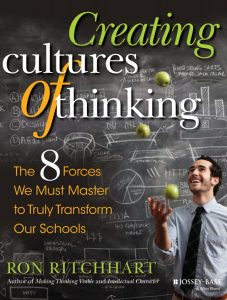 Creating cultures of thinking: The 8 forces we must master to truly transform our schools,
Creating cultures of thinking: The 8 forces we must master to truly transform our schools,
by Ron Ritchhart
Niveau scolaire (Grade level): K – 12
This book outlines eight forces which are needed to create a culture of thinking in the classroom: expectations, language, time, modeling, opportunities, routines, interactions, and environment.
 Critical thinking and formative assessments: Increasing the rigor in your classroom,
Critical thinking and formative assessments: Increasing the rigor in your classroom,
by Betsy Moore and Todd Stanley
Niveau scolaire (Grade level): K – 12
The authors suggest that critical thinking is a key tool in creating more rigor in the classroom. They demonstrate the difference between higher- and lower-level thinking, how to write higher-level thinking questions, and how to assess critical thinking strategies.
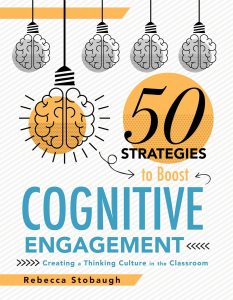 50 strategies to boost cognitive engagement: Creating a thinking culture in the classroom,
50 strategies to boost cognitive engagement: Creating a thinking culture in the classroom,
by Rebecca Stobaugh
Niveau scolaire (Grade level): K – 12
The author shares how to build a culture of thinking that emphasizes essential 21st century skills, from critical thinking and problem-solving to teamwork and creativity. She presents 50 teacher-tested instructional strategies for nurturing students’ cognitive abilities, as well as Take Action activities for student engagement in the classroom.
Les livres d’images (Picture Books)
by Peter H. Reynolds & Paul A. Reynolds; illustrated by Peter H. Reynolds
Niveau scolaire (Grade level): Préscolaire – 3 (Pre-K – 3)
It’s time for this year’s Going Places contest! Rafael has looked forward to the Going Places contest and builds his go-cart from a kit in record time, but his neighbour, Maya, has a much more interesting and creative idea for her entry and Rafael decides to help.
by Amy Krouse Rosenthal; illustrated by Tom Lichtenheld
Niveau scolaire (Grade level): Préscolaire – 1 (Pre-K – 1)
Is it a duck or a rabbit? Depends on how you look at it! A smart, simple story that will make readers of all ages eager to take a side, Duck! Rabbit! makes it easy to agree on one thing, reading it again!
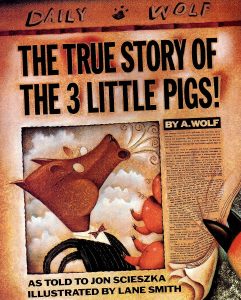 The true story of the 3 little pigs,
The true story of the 3 little pigs,
by A. Wolf; as told to Jon Scieszka; illustrated by Lane Smith
Niveau scolaire (Grade level): Préscolaire – 3 (Pre-K – 3)
You’ve heard the story of the 3 little pigs but you’ve yet to hear the Wolf’s side of the fairy tale. Recounted by the wolf, an outlandish version of what “really” happened when he tangled with the three little pigs.
by Kobi Yamada; illustrated by Mae Besom
Niveau scolaire (Grade level): Préscolaire – 3 (Pre-K – 3)
This is the story of one brilliant idea and the child who helps to bring it into the world. As the child’s confidence grows, so does the idea itself. And then, one day, something amazing happens. This is a story for anyone, at any age, who’s ever had an idea that seemed a little too big, too odd, too difficult.
by Andrea Beaty; illustrated by David Roberts
Niveau scolaire (Grade level): Préscolaire – 2 (Pre-K – 2)
Ada is curious; she spends almost all her time asking questions about why things are they way they are. Her family supports her – at least, until the day she looks for the source of a horrible smell.
by Ashley Spires
Niveau scolaire (Grade level): Préscolaire – 2 (Pre-K – 2)
A little girl and her dog set out to make the most magnificent thing. When it doesn’t turn out the way they expect, they step back and think about what they need to do next.
by Il Sung Na
Niveau scolaire (Grade level): Préscolaire – 2 (Pre-K – 2)
A curious elephant discovers a mysterious red object. He finds out what it is the best way he knows how: by experimenting with it.
by Chris Haughton
Niveau scolaire (Grade level): Préscolaire – 1 (Pre-K – 1)
Four friends creep through the woods, and what do they spot? An exquisite bird high in a tree! ‘Hello birdie, ‘ waves one. ‘Shh! We have a plan, ‘ hush the others. They stealthily make their advance, nets in the air. Ready one, ready two, ready three, and go!
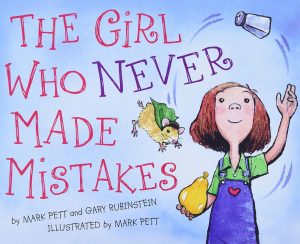 The girl who never made mistakes,
The girl who never made mistakes,
by Mark Pett & Gary Rubinstein; illustrated by Mark Pett
Niveau scolaire (Grade level): Préscolaire – 3 (Pre-K – 3)
Beatrice has never made a mistake. She never forgets her math homework, she never wears mismatched socks, and she always wins the yearly talent show at school. One day, the inevitable happens: Beatrice makes a huge mistake in front of everyone. But in the end, she realizes that life is more fun when you enjoy everything–even the mistakes.
Non-Fiction
by Liz Brown
Niveau scolaire (Grade level): 4 – 7
This book explores questions like “What is important information?” and “How can I improve the way I think about subjects?”, and demonstrates how students can learn to think more critically about the information they encounter. For more books in the Social Studies Essential Skills series, click here.
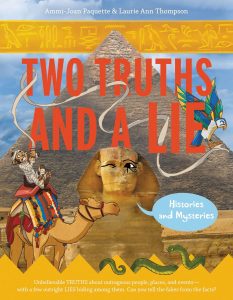 Two truths and a lie: Histories and mysteries,
Two truths and a lie: Histories and mysteries,
by Ammi-Joan Paquette & Laurie Anne Thompson
Niveau scolaire (Grade level): 2 – 7
Crazy-but-true stories about history, geography, and human achievement make this nonfiction series ideal for fans of curiosities and wonders. A fun way for middle graders to explore ways to separate fact from fiction.
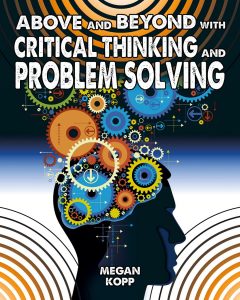 Above and beyond with critical thinking and problem solving,
Above and beyond with critical thinking and problem solving,
by Megan Kopp
Niveau scolaire (Grade level): 4 – 9
This innovative title explores the ways that critical thinking can be applied to problem solving in school, work, and social settings. Real-world examples and opportunities for hands-on practice support readers as they learn how to frame, analyze, and synthesize information.
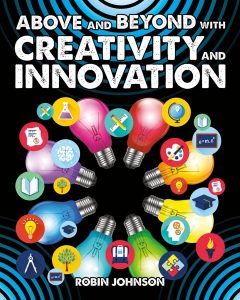 Above and beyond with creativity and innovation,
Above and beyond with creativity and innovation,
by Robin Johnson
Niveau scolaire (Grade level): 4 – 9
Creativity and innovation are central to success in the 21st century. This dynamic title provides a comprehensive look at creative processes in a variety of settings. Readers are introduced to various brainstorming techniques and will learn different approaches to help refine and evaluate their ideas.
Trouver d’autres ressources
Voici quelques conseils pour trouver d’autres ressources dans ce domaine :
- Sur la page principale du site de la bibliothèque de l’UBC, utilisez la boîte de recherche générale pour rechercher des matériaux à travers toutes les succursales de la bibliothèque de l’UBC.
- Pour limiter vos résultats aux matériels disponibles à la Bibliothèque de l’éducation, visitez le site web de la Bibliothèque de l’éducation et effectuez une recherche à l’aide de la case “Search Education Resources” située dans la bande à gauche de l’écran.
- Remarque : les ressources étant principalement cataloguées en anglais, les termes ci-dessous donnent généralement plus de résultats que les recherches effectuées en français. Vous pouvez filtrer votre liste de résultats par langue dans la barre latérale de gauche.
- Utilisez des termes de recherche spécifiques, tels que
- “creative thinking OR critical thinking AND creative teaching OR teaching”, “questioning”, “information literacy”, “thought and thinking”, “inquiry-based learning AND teaching”, “creative ability OR inspiration AND juvenile fiction OR fiction OR non-fiction”, ou “self-confidence AND juvenile fiction OR non-fiction”
- Pour trouver des plans de cours, incluez “lesson plans”, “lesson planning”, or “activity programs” dans vos termes de recherche.
Finding More Resources
To find more resources in this area, try the following:
- Search using the General tab on the UBC Library website to look for material in all UBC Library branches.
- Search using “Search Education Resources” box in the left hand bar on the Education Library website to limit your results to physical materials in the Education Library.
- Use specific search terms, such as
- “creative thinking OR critical thinking AND creative teaching OR teaching”, “questioning”, “information literacy”, “thought and thinking”, “inquiry-based learning AND teaching”, “creative ability OR inspiration AND juvenile fiction OR fiction OR non-fiction”, ou “self-confidence AND juvenile fiction OR non-fiction”
- To find lesson plans, include “lesson plans”, “lesson planning”, or “activity programs” in your search terms.
